
When it comes to developing faster and leaner websites, the best option you have is to use a static site generator over more complex Content Management Systems like WordPress. A static site generator allows you to generate static HTML pages that can be easily served by any webserver without relying on a database connection or dynamic page generation. In this post, we take a look at some of the top static site generators we have available as an option.
Why choose Static Site Generators
Here are the main reasons to choose a static site generator over a CMS:
- Cut down infrastructure cost.
- Host static site for free.
- Remove security worries.
- Increasing performance of your website.
- Open source and free to use.
- Active community and support.
- Easy integration with JavaScript frameworks such as React and Vue.js.
- Easy integration with existing HTML templates.
Top Static Site Generators
The popularity of Jamstack has given rise to many static generators. Let’s take a look at the most popular static site builders in 2021. These offer great community support as well as good documentation and adoption.
1. 11ty
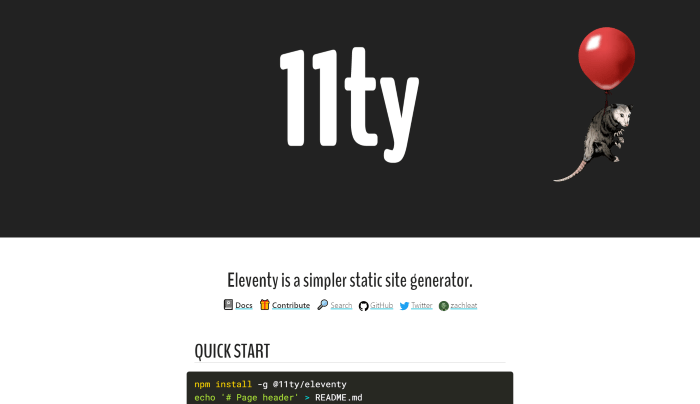
11ty is a Node.js based static site generator which can compile simple markdown files into HTML or can help you setup a full website with templating languages such as Nunjucks, Liquid, Handlebars, Pug etc. 11ty has extensive support for many templating languages. It also offers using static or dynamic data in your static site during build time. Many starter projects are available for you to learn from. 11ty is our current choice of static site generator.
2. Hugo

Hugo is a static website engine built with the Go programming language. It is known for its speed taken to generate static websites. Just like any other static site, sites built with Hugo can be deployed on S3, GitHub Pages, Dropbox or any other web host.
3. Gatsby

Gatsby is an open source framework based on React that helps developers build websites as well as apps. You can pull data from CMS such as WordPress, Drupal or from markdown files or JSON files and use HTML, CSS and React to build your static site. Extensive documentation is also available on their site.
4. VuePress

VuePress is a Vue powered static site generator which requires minimal setup and generates static site from markdown files. When using VuePress, you can easily use Vue components in your markdown, and develop custom themes with Vue. VuePress generates pre-rendered static HTML for each page, and runs as an SPA once a page is loaded.
5. Jekyll

Jekyll is a blog-aware static site generator and is the engine behind GitHub Pages, which you can use to host sites right from your GitHub repositories.
Jekyll is powered by Ruby; however, knowledge of Ruby language is not necessarily required for using Jekyll. It uses files written in Markdown formats and converts them into static HTML pages. Additionally, Liquid tags are used for templating. Jekyll provides good documentation on how to migrate from other environments. We have collection of best Jekyll themes you can use to build your portfolio and blog.
6. Middleman

Middleman is another popular static site generator built with Ruby. It is considered to be more flexible than Jekyll however, it can be slightly more complex than Jekyll to setup for beginners. Similar to Jekyll, Middleman has great community support and extensive documentation to get you started.
7. Hexo
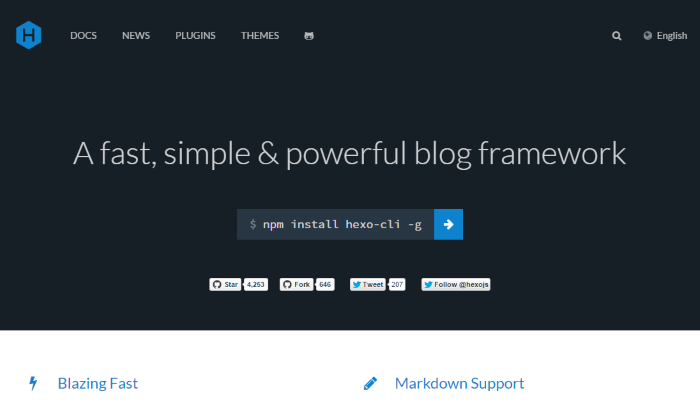
Next, we have Hexo, a fast & powerful blog framework built on top of Node.js. With availability of plug-ins and support for Markdown, Hexo is another good option specially for JavaScript & Node.js lovers.
8. Pelican
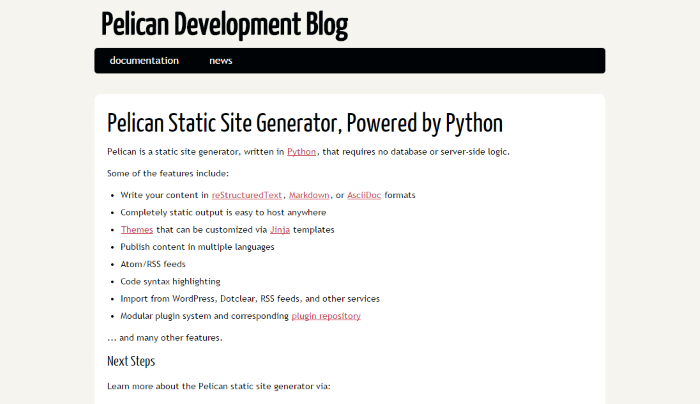
Pelican is a static site generator, written in Python, which supports content in reStructuredText, Markdown, or AsciiDoc formats. Pelican also supports import from WordPress, RSS feed or other services. Do take a look at Pelican if you are developing with Python.
9. Sculpin
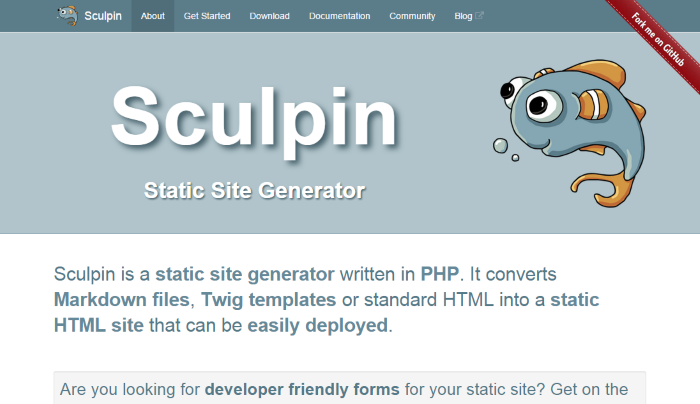
Sculpin is a static site generator written in PHP. It converts Markdown files, Twig templates or standard HTML into a static HTML site that is easily deployable. If your language of choice is PHP, you’ll feel right at home with Sculpin. Sculpin embeds Composer to keep your source control focused and projects consistent.
10. Harp
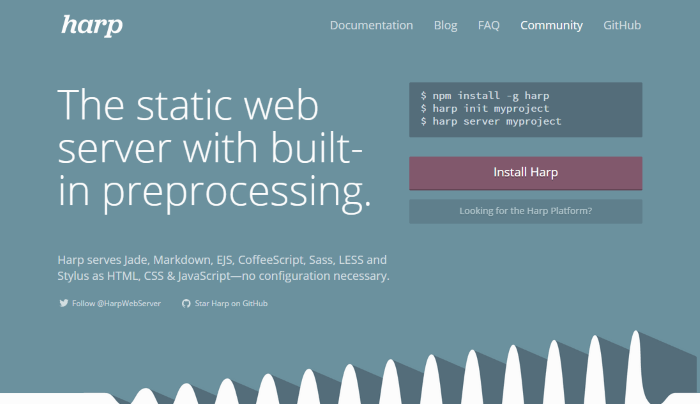
Harp is a static web server with built-in preprocessing capabilities making it ideal for generating static pages. Harp understands Jade, Markdown, EJS, CoffeScript, Sass & Less and can serve them as HTML, CSS & JavaScript without needing any configuration.
11. Metalsmith

Metalsmith is a pluggable static site generator. All of the logic in Metalsmith is handled by plugins and you can chain multiple plugins together to get the final output. Since the core library is actually just an abstraction for manipulating a directory of files, Metalsmith is capable of doing much more than just static site generation. It can be used to generate PDF, ePUB or MOBI e-books, generate documentation and much more.
Before you opt for Static Sites
Before you get started with static websites generators, you must know that these generators are ideal for generating static HTML pages along with any required CSS and JavaScript for your websites. They, by definition, lack implementing server-side dynamic features such as session management or a database. Depending on your use case, this could be a benefit (better security & performance) or a serious blocker (like absence of CMS or user management system). You can add CMS to your static site generators by using Netlify CMS or Forestry.
Here are the main reasons why a Static Site generator may not work out for you:
- Lack of easy CMS editor.
- Lack of integration with visual page builders.
- Not very easy to extend functionality through plugins.
- You would need a developer (or need to know coding yourself) to make major site changes such as adding new sections, sidebar, sponsor ads etc.
- May not be easy if you have multiple editors on your site.
If you are building a website for your business or startup then there are many options that you may want to consider instead of a static site. These options include creating a website with a CMS like WordPress or using a website builder such as Wix. To get started with WordPress, you can check our tutorial on how to setup a WordPress blog.
In case of static site, you can rely on the client side JavaScript code and external services to implement dynamic content such as using Disqus for comments or Formspree for contact forms. Ultimately, I would advise giving a thorough thought to your choice of static websites and know what you are building. With growing community around these static site generators, you are sure to find great helping hands in case you get stuck.
Please feel free to ask questions or leave your feedback about these static site generators in the comments below.

One dummy question :)
I don’t really understand the programminh language site gen. is built on, does it restrict the choice of (free) hosting that is hosting should be able to interpret specific language the site is built on (site gen. language) ?
Hi Ellie, all these static site generators produce simple HTML+CSS+JavaScript files which don’t need server side interpretation and can be hosted using any hosting providers. Regardless of the programming language the static gen is built-on, you can setup a local development environment and compile the static site on your local dev machine. The generated webpages can then be moved to your hosting provider via FTP or other methods.
On the other hand, if you choose Jekyll, you will be able to host your site for free on GitHub pages and GitHub will also take care of compiling your static site. If you are interested in this approach then I would recommend you to read this guide by Smashing Magazine.
hows the blog on next.js would be , any better than hugo or 11ty in terms of speed and seo?
and btw is there any boilerplate similar to SDR?
Hey Praveen,
All static site generators have their ups and downs. In terms of pure speed I believe Hugo will win.
Next.js can offer much more than just a blog.
My personal favorite is 11ty as it is fast enough and provides easy plugins for SEO, RSS etc and also allows me to inject custom transformation logic which is a plus and missing from some other generators.
We moved SDR, back to WordPress (https://superdevresources.com/jekyll-to-wordpress/) from static generator and are using GeneratePress theme with some customizations. Additional optimizations, NGINX cache and Cloudflare APO is being used to make it achieve the speed of static sites.